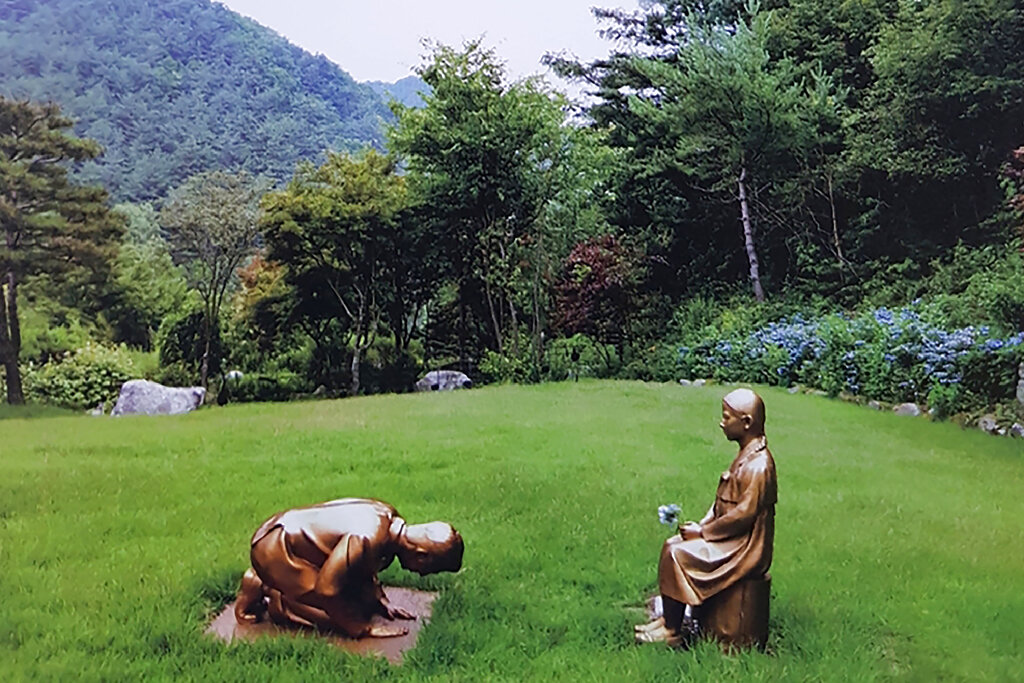New statues stoke sensitivity between South Korea, Japan

In this undated photo provided by The Korea Botanical Garden, statues of a man kneeling in front of a girl symbolizing victims of sexual slavery by Japan’s World War II military at the Korea Botanical Garden in Pyeongchang, South Korea. The statue has become the latest subject of diplomatic sensitivity between the countries, with Tokyo’s top government spokesman questioning whether the figure represents Prime Minister Shinzo Abe. (The Korea Botanical Garden via AP)
SEOUL, South Korea — A pair of new statues in South Korea of a man kneeling in front of a girl symbolizing a victim of sexual slavery by Japan’s wartime military is the latest subject of diplomatic sensitivity between the countries, with Tokyo’s government spokesperson questioning whether the male figure represents the Japanese prime minister.
Kim Chang-ryeol, owner of a botanic garden in the mountain town of Pyeongchang, told The Associated Press on Tuesday that he canceled an unveiling ceremony for the bronze statues that was to take place on Aug. 10 because of what he described as unwanted controversy.
Kim said the statues were his idea, but that he didn’t specifically intend the male figure to be Japanese Prime Minister Shinzo Abe. Since his inauguration in 2012, Abe has stoked anger among South Koreans over his nationalistic stance on Japan’s wartime past and his demands that South Korea remove similar statues symbolizing sexual slavery victims in front of the Japanese Embassy in Seoul and other sites.
But the statues at Kim’s garden also drew criticism among some South Koreans, who described them as tacky or excessively provocative on social media. Kim defended the statues, saying they reflect his wish for the countries to resolve their conflicts over history. He didn’t expect the statues to trigger political debates.
“The man could be Abe and also couldn’t be Abe,” said Kim, who will keep the statues at his garden. “The man represents anyone in a position of responsibility who could sincerely apologize to the victims of sexual slavery, now or in the future. It could even be the girl’s father. … That’s why the statues were named ‘Eternal Atonement.’’’
Article continues after this advertisementRelations between South Korea and Japan sank to their lowest point in decades last year as they allowed their decades-long disputes over wartime history to spill over into issues related to trade and military cooperation.
Article continues after this advertisementDuring a briefing in Tokyo, Japanese Chief Cabinet Secretary Yoshihide Suga said it would be unacceptable under “international courtesy” if the statues’ male figure did indeed represent Abe.
“I think such a thing is unforgivable under international courtesy,” Suga said.
Kim In-chul, South Korea’s foreign ministry spokesperson, acknowledged that countries should consider “international comity” in regard to foreign heads of state, but he didn’t provide a clear answer when asked whether private citizens should be asked to follow such practices.
Disputes over sex slaves are a legacy of Japan’s 1910-45 colonial occupation of the Korean Peninsula. Historians say tens of thousands of women from around Asia, many of them Korean, were sent to front-line military brothels to provide sex to Japanese soldiers during World War II.
Under South Korea’s previous conservative government, the countries attempted to settle the dispute over sexual slavery in a 2015 agreement for Tokyo to provide 1 billion yen ($9 million) to a Seoul-based foundation to help support victims.
The deal was hugely unpopular in South Korea, where many people criticized their government for settling for too little and accused Tokyo of attempting to silence the victims with money. The liberal government of current South Korean President Moon Jae-in, who took office in 2017, took steps to dissolve the foundation, saying the deal lacked legitimacy because officials failed to properly communicate with the victims before reaching it.